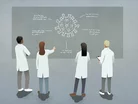From education to industry: A robust path for women in STEM

Looking back at my time in university studying geology, the gender balance in my course was relatively evenly split between men and women – which is fairly usual for geology in Ireland. These days, many of the STEM disciplines have a reasonably balanced gender split at the undergraduate level; biology fields often have a higher proportion of women, but maths, physics, engineering, and technology disciplines tend to be more male-dominated.
Where differences begin to emerge in gender balance is after graduation and PhD level. Developing an academic career in STEM can be a very demanding and uncertain path. Balancing research, teaching, and supervising students can mean long working hours and working weekends. With the added complications of winning research funding, short-term contracts and trying to secure a permanent academic position. For many early-stage researchers, there comes a time when they need greater financial and career security, especially if they have family and caring responsibilities. That's where many, particularly women, fall out of the academic side of STEM.
Initiatives supporting women in STEM
There are two challenges in STEM: Attracting girls into STEM and retaining women already in STEM. Third-level institutions and STEM research funding bodies have taken action to support women's academics, including requiring a university to have equality action plans in order to receive research funding and targeted research funding for women. Companies too are very focused on diversifying their workforce and gaining from the greater depth of ideas and innovation diversity brings. In the UK and Ireland, only 25% of the STEM workforce are women, which means there are many opportunities and pathways for women to build meaningful and rewarding careers in STEM industries
There are many excellent initiatives to attract girls into STEM and women back into the STEM workforce. In Ireland, there are over 30 different programmes. Some that come to mind include I Wish, a programme that engages with female secondary school students to showcase the power of STEM; Women ReBOOT supporting women with tech sector skills and experience to return to work after a career break, and Connecting Women in Tech, a network of technology companies (including Accenture, Dell and Micorsoft) with a shared mission to attract, retain and promote women in the technology sector. And going back to my geology roots, Get into Geoscience – Ireland which introduces second-level students to geosciences.
Opportunities for women in STEM
STEM students have so many of the skills that are essential for the future of work – such as great critical thinking and analytical skills, complex problem-solving, innovation, and most importantly curiosity and a desire to discover. These skills make them very desirable candidates, not only for a role within their own scientific discipline but across a range of industry roles. However, very often STEM students don’t know what working in STEM looks like, or what career paths are available in the industry. For example, I work with people in learning and development roles who started out as engineers. Multinationals provide great opportunities for individuals who show ability, initiative and aptitude to learn and grow.
Providing opportunities for STEM students to experience different industry roles before they finish the third level is crucial in transitioning them to the STEM workforce. Placement programmes established between universities and industry work incredibly well on two fronts – students get visibility on working in the industry and the roles they could pursue, and companies can recruit top talent early on.
A number of collaborations have now struck up between Irish universities and multinationals – one that comes to mind is the partnership between the University of Limerick and a number of tech companies, including Stripe, Intercom and Workday, on a new type of computer science course. Students will spend half their time learning on campus and the other half in paid residences with the partnering companies working on industry problems.
Working with STEM multinationals I see the breadth of interesting and exciting roles that have real societal impact. I would strongly encourage girls to take up STEM subjects at school and third level, as I strongly believe it will give them the skills and knowledge to access new opportunities emerging as the industry responds to economic, social, and environmental challenges, and enable them to create the career you want for yourself.
About Aisling
Aisling holds a PhD in Structural Geology – and has experience as a researcher and lecturer in Earth Science. Now working on skills, training, and talent development in IDA Ireland, one of Aisling’s key roles is supporting IDA’s client companies to develop the workforce skills required in a fast-changing industry landscape and the future skill requirements of the STEM sector.
